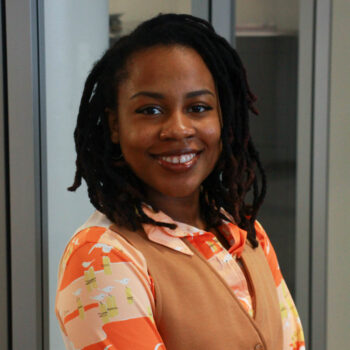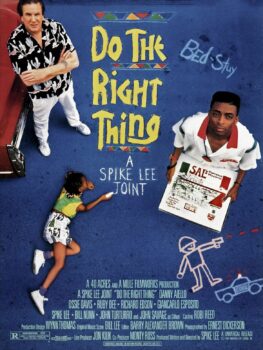
Dashae Engler
“Do the Right Thing,” directed and starring Spike Lee, was released in 1989. The film is about the complexities of being black in America. In 2023 at the Toronto International Film Festival while accepting the Ebert Director Award Spike Lee recalled the press discouraging people from seeing it. They believed black people would see this movie and riot. They were even told that they should reconsider the release date so it isn’t in the summer. Fortunately, they stayed true to the timeline and there were no riots.
I will be spoiling the plot and the ending in this review. I can’t do a proper analysis of the film without doing so. I will also discuss the critiques of the film and if I agree with them. I want to talk about the themes of the film and why it is still important in 2024.
“Do the Right Thing” takes place in a neighborhood in Brooklyn one hot summer day. The story has many characters, but the main ones are Mookie (Spike Lee), Sal (the owner of the pizzeria, played by Danny Aiello), and Sal’s two sons, Pino (John Turturro) and Vino (Richard Edson. Mookie’s friends Bugging Out (Giancarlo Esposito) and Radio Raheem (Bill Nunn) play an important role as well.
The plot starts when Buggin Out confronts Sal about not having black people on his wall in the pizzeria. Buggin Out points out that all his customers are black, so he should show his respect for his customers and have at least one black person on the wall. This doesn’t go well, and he is kicked out. He vows to boycott the establishment and tries to recruit more people. He then finds Radio Raheem, who is happy to boycott with him.
They go to Sal’s Pizza and start yelling and playing Radio Raheem’s music, “Fight the Power” by Public Enemy. Sal screams at them using racial slurs and eventually breaks the radio. It is quiet for a moment, and Raheem tries to strangle Sal. The police showed up and killed Radio Raheem using excessive force and threw him in the back of their car. Everyone riots, burning down Sal’s Pizza. There is no resolution, only the aftermath. Making us wonder what to do next. Lee leaves the audience with quotes from Martin Luther King, Jr. and Malcom X, offering opposing perspectives on the use of violence to achieve their means.
 The author, theorist, and educator bell hooks dedicated a whole chapter to “Do the Right Thing” in her book “Yearning.” hooks challenges that this is not a black radical movie but that is to be expected. She said Radio Raheem wasn’t sympathetic because it was hard to see his killing as a murder. There is little to no mention of it when people talk about it. The only people who empathized with Radio Raheem were black people who knew one bad day, and that could easily be their fate. That doesn’t make for a good martyr though.
The author, theorist, and educator bell hooks dedicated a whole chapter to “Do the Right Thing” in her book “Yearning.” hooks challenges that this is not a black radical movie but that is to be expected. She said Radio Raheem wasn’t sympathetic because it was hard to see his killing as a murder. There is little to no mention of it when people talk about it. The only people who empathized with Radio Raheem were black people who knew one bad day, and that could easily be their fate. That doesn’t make for a good martyr though.
Many people who watched the movie related to Mookie because he was a cool and critical thinker. However, it feels like Spike Lee is directing the film inside the movie. This creates a sense of black elitism that can’t be ignored. Besides him and his sister, most of the characters are caricatures, with no dimension. When it comes to the women in the film, they are all subject to sexual objects at some point in the film. This is a very good example of how black women are typically pushed to the back burner of black liberation.
She makes a good point that fewer white people would praise this film if Sal or one of his sons got killed. All of Sal’s losses can be reclaimed and recovered. This is her true problem with the movie: that just because Spike Lee is black, he shouldn’t be able to profit from black suffering. I wonder what would have happened if they picked someone else to die. I wonder too how the perception of the movie would be different if they picked a more fleshed-out character to die.
Lastly, she also responded to the critics who believed that the movie would make people want to riot. She said she couldn’t understand how they came to such a conclusion. Black people are taught to obey an oppressive society. There was nothing in the movie that indicated that rioting was the right thing to do. There were only examples of why it was clearly not. The violence in the movie didn’t provoke anger or action but sadness and helplessness. I agree that this movie wouldn’t make black people riot because the nature of it never calls to do so. Black people also wouldn’t riot simply because they saw a movie.
With that being said, I think bell hooks missed the point of the movie. It’s supposed to be satire. The characters weren’t flushed out because they were intentionally exaggerated. This movie wasn’t a critique of the system but a hyperbolic lens into it.
I think bell hooks made some good points. I agree about how the women were portrayed and how Lee could have given them more leadership in the decision-making; instead of using them as props, find a better way to include them. I also believe Lee separated himself from the characters a bit too much. This causes us to separate ourselves from the characters.
Despite its flaws, I found the film fascinating. I love how the dialogue sounded at times like spoken poetry. I was interested in all the characters and what they had to say. It was a two-hour film and it flew by.
My favorite part was the emphasis on the heat. Spike Lee tells us it is hot by showing us the news that this is the hottest day on record. To me, the heat represents the racial intention in the community, not just between the people residing there but the systematic racial intention. The police, poverty, and local businesses, which are not owned by blacks yet are located in a black neighborhood.
This oppressive heat is imposed on them. They have no choice but to be in it and endure it. They can’t attack poverty because it is intangible. They can’t attack the police because they will lose. That only leaves the local business.
The local business is a byproduct of the other two oppressors, but it is the only thing they can fight back against. So, setting it on fire symbolizes their attempt at seizing control.
When Sal says, “They say it’s even gonna be more heat today.” It let us, viewers, know that riots did nothing to help them but made them worse off. However, it doesn’t tell us the right thing to do because no one knows. We only know for sure what the wrong thing to do is.
There is no such thing as doing the right thing in corrupt symmetric structures. So, how do we navigate and create better opportunities for minorities in these structures? Will we ever do right by them?





Comments